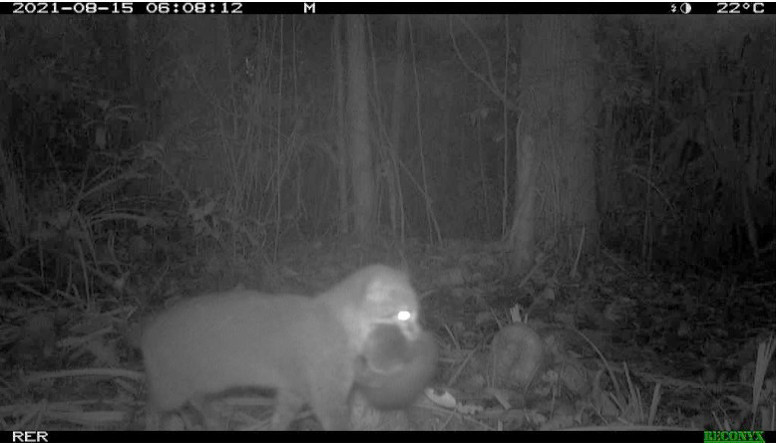January 23, 2025
The Flat-headed cat (Prionailurus planiceps), a rare and endangered species, inhabits the peat swamp forests of Sumatra, Borneo, and Peninsular Malaysia. Known for its elusive nature and preference for semi-aquatic habitats, this species plays a critical role in the conservation of Southeast Asia’s biodiversity. Despite its significance, historical data on the Flat-headed cat has been scarce. However, recent findings by the Restorasi Ekosistem Riau (RER) have provided groundbreaking insights into the species’ behavior.
In August 2021, RER Biodiversity Officer, Dian Andi Syahputra and RER Restoration Specialist, Muhammad Iqbal, documented the first confirmed breeding record of the Flat-headed cat on the Kampar Peninsula, Sumatra. Using camera traps deployed in the region, the researchers captured footage of a female Flat-headed cat carrying a kitten. This discovery marks a significant milestone, as the Kampar Peninsula is home to one of the last remaining large expanses of natural peat swamp forests in Sumatra, a crucial habitat for this endangered species.
The findings were published in the latest issue of CATnews, a leading journal focused on wild cat conservation. RER has been actively monitoring of wildlife on the Kampar Peninsula since 2015, collecting valuable data on the Flat-headed cat’s ecology and habitat preferences. These insights are essential to better understand the species’ behavioral patterns and to inform future conservation strategies.

The Kampar Peninsula is recognized as a key area for the Flat-headed cat’s survival, as it contains one of the largest remaining stretches of peat swamp forest in the region. The confirmation of successful breeding in this area strengthens its importance as a conservation priority. Given the ongoing threats to peat swamp ecosystems from deforestation and land conversion, continued monitoring and enhanced research efforts are necessary.
RER recommends the use of advanced tracking technologies, such as GPS and radio collars, to further monitor the Flat-headed cat’s behavior and movements. These tools will provide critical data to improve conservation measures and ensure the long-term survival of the species.
This breakthrough discovery highlights not only the ecological importance of the Kampar Peninsula but also the urgent need for ongoing protection and restoration efforts to preserve the unique habitats that sustain the Flat-headed cat and other endangered species.